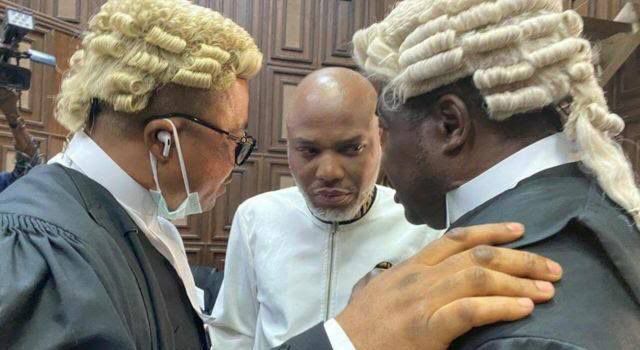Court Dismiss FG’s Evidence Against Nnamdi Kanu
The Federal High Court in Abuja on Thursday dismissed evidence presented by the Federal Government in the trial of Nnamdi Kanu, the leader of the outlawed Indigenous People of Biafra (IPOB).
In his ruling, Justice James Omotosho sided with the argument made by Kanu’s lead counsel, Paul Erokoro (SAN), who cited a Supreme Court decision that mandates a suspect must have legal representation present when giving an extra-judicial statement. Although Section 17(2) of the Administration of Criminal Justice Act (ACJA), 2015, uses the term “may” suggesting that a lawyer’s presence is optional Justice Omotosho emphasized that the apex court’s interpretation overrides this, making a lawyer’s presence during such statements compulsory.
READ ALSO: e-Health To kickstart In Ondo Under FG Initiative
Earlier, the court had temporarily halted proceedings to rule on the admissibility of the evidence, which followed submissions by both the prosecution, led by Suraj Saida (SAN), and the defence.
Delivering his verdict after a trial-within-trial, the judge stated the key issue was whether Kanu’s statements were legally admissible. While he acknowledged that Kanu did not prove he was coerced, video footage showed Kanu repeatedly asserting that his statements were made without access to his legal counsel. Justice Omotosho underlined that this violated his fundamental rights, particularly in light of the serious nature of the charges.
The judge ruled that any confessional video or written statement must demonstrate that the accused’s lawyer was present, or else it would not be admissible in a criminal trial. Based on this, he rejected and struck out the video and written statements obtained from Kanu in October and November 2015.
He said the statements made in 2015, as well as the video recordings from his sessions with the Department of State Services (DSS), which had been admitted as Exhibits PWQ and PWR, were no longer valid and would be removed from the court records.
This development followed Kanu’s claims that the statements were extracted under pressure. He alleged the DSS interrogators denied him legal access, subjected him to threats, restricted his outdoor time despite health concerns, and tried to coerce him into making statements about former President Goodluck Jonathan and ex-Governor Rochas Okorocha. Kanu also stated that he was held in solitary confinement and that the video evidence shown in court had been edited.

